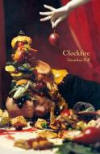Clockfire
In his “36 Assumptions About Playwriting,” José Rivera instructs, “In all your plays be sure to write at least one impossible thing. And don't let your director talk you out of it.” Jonathan Ball takes this idea to a new level in his collection, Clockfire. Billed as poetry on its press release, this genre-defying collection consists of “blueprints for imaginary plays that would be impossible to produce.”
In his “36 Assumptions About Playwriting,” José Rivera instructs, “In all your plays be sure to write at least one impossible thing. And don't let your director talk you out of it.” Jonathan Ball takes this idea to a new level in his collection, Clockfire. Billed as poetry on its press release, this genre-defying collection consists of “blueprints for imaginary plays that would be impossible to produce.”
The collection appropriately opens with an epigraph from Artaud, and the prose pieces that follow fall under the umbrella of his theatre of cruelty: plays where the spectators are at the center of the spectacle, where they must engage the performance. Further, there is something sinister at work in these imaginary productions; the spectators will be changed forever by the performances they witness and ultimately are a part of. In many instances, the performances never end, as in “The Audience is Called”:
The audience is called to the stage from their seats. The actors tutor them, not how we might expect, but rather to undo their social training, to act on their basest impulses. Once they have lost all self-control, they are set loose. Theatres are abolished. Everywhere now, everywhere one looks, some nightmare unfolds as they perform.
The spectators are again and again called forth and let loose into a darker reality. In “The Coffee Shop,” the play calls for a simple scene: “Everyone enjoys a hot cup of coffee while, outside, something terrible is coming to change everything.” Though often the audience is unaware of the future that awaits them, sometimes they welcome it, as in “Tabula Rasa”:
As the members of the audience enter the theatre, their memories are wiped clean. This is all advertised on the posters, and the actors warn the audience members again as they enter. And still, the line extends for many miles.
The darkness in this collection is certainly not without humor. There is something of Jackson Mac Low’s dances in these pieces, where the instructions to the performers sometimes lie outside of the realm of the possible, as in “Breakdown”: “The audience comes apart, breaking into individual atoms.” There is also something of Italo Calvino’s Imaginary Cities, with Clockfire’s constant re-imaginings, and something of Borges too, with its repetitions and infinite regressions. Overall Clockfire is a fun read, worth re-visiting, though if a Clockfire Festival ever does come about, as is mused in “Autography,” it might be wise for the audience to stay at home, and Ball will then have an answer to his questions regarding a play without an audience: “And what of the show? Must it go on without them?”





